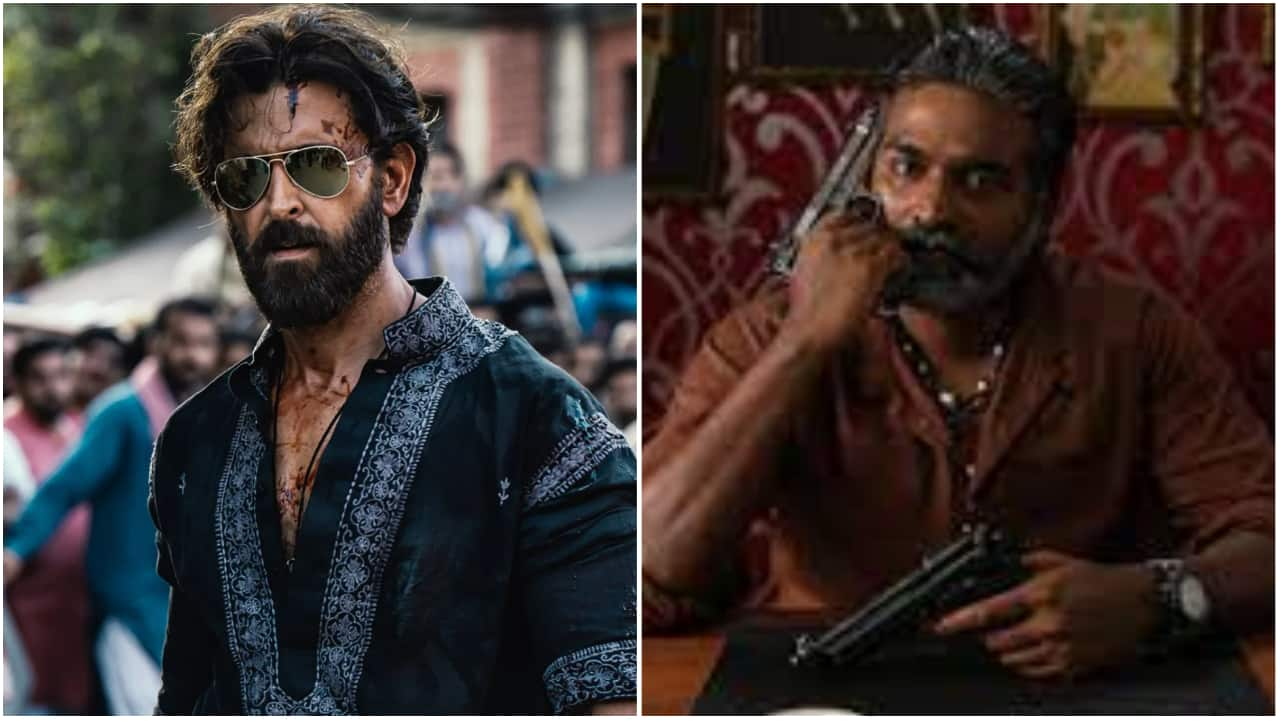



When Vikram Vedha with R. Madhavan and Vijay Sethupathi came out in Tamil five years ago, it cemented the latter’s star status. Not only that, lines from the film like “Oru kadha sollata, sir?” (Shall I tell you a story, sir?) became so iconic that they are now part of Tamil meme culture and everyday parlance. The Hindi remake, also directed by Pushkar-Gayathri, moves the action from the gullies of North Madras to Kanpur and Lucknow.
The Vikram-Vetal folklore revolves around an upright king and a talkative vetal who presents him with dharmic dilemmas. The king has to use his reasoning prowess to arrive at a conclusion, and in many instances, it is a counter-intuitive answer. This ‘bond’ between Vikram and the vetal is the frame story for many smaller ones. In the contemporary world imagined by the film, Vikram (Saif Ali Khan) is a police officer who has clear ideas about good and evil, black and white, police and criminal. The vetal is Vedha (Hrithik Roshan), a violent gangster who unexpectedly decides to surrender to the police just as they’re planning an encounter to eliminate him. He does so for a unique reason – he wants to tell Vikram a story.
Vikram Vedha has a tight screenplay, and takes the writing principle of Chekhov’s gun very seriously. There’s no detail in the film that is insignificant, and it starts from the opening scene – a long tracking shot of the officers as they banter, plan and execute an encounter. Vikram, dressed in white, does not hesitate a moment before pulling the trigger. But as the plot unfolds, he becomes less and less sure about his actions. The line separating good and bad begins to blur. The white becomes grey and eventually black.
Also read: Hrithik Roshan: 'Vikram Vedha is the best piece of writing I have worked in'
Saif does a commendable job of bringing out this conflict within Vikram; his body language, so assured in the beginning, begins to change as he’s assailed by self-doubt. As the camera whirls around policeman and criminal, their positions jostle and shift. It’s also a metaphor for Vikram’s line of vision; as Vedha tells him, he has a tendency to be a horse with blinkers. How does the story change when he gets 360-degree vision through Vedha’s stories?
Hrithik is wonderful as Vedha, exuding a manic energy that takes over the frame each time he’s in it. He is far more agile than Vijay Sethupathi, and the directors make full use of his flexibility in the stunts. The scene when he walks through the densely packed bylanes to escape from the police is therefore more dramatic than it was in the original. And instead of the humble ‘Tasakku Tasakku’ booze song in the Tamil version, there’s a Bollywoodized dance party in the remake that has Hrithik unleashing his magic on the dance floor. But if I had to choose between the two, I would still score VJS higher – he brought a sardonic vulnerability to Vedha that’s inseparable from the character. When VJS walks into the commissioner’s office with a vadai in his hand, it doesn’t look like a prop; it looks like a signature Vedha move.
 Hrithik Roshan (left) and Vijay Sethupathi as Vedha.
Hrithik Roshan (left) and Vijay Sethupathi as Vedha.Radhika Apte plays Vikram’s wife, Priya. She’s a lawyer and another pawn in the chessboard drawn by Vedha. The actor is reliably good though she ends up becoming little more than a courier between the two men, as she herself terms it. Rohit Saraf as Shatak and Yogita Bihani as Chanda play key roles as a couple in love but they lack chemistry – and for how much longer are we going to romanticize slapping as a sign of intimacy in a relationship? Of the supporting cast, it is Manuj Sharma who stands out as the earnest constable who is new to the force. His wet-behind-the-ears face is comic and endearing, and is the perfect foil for Saif’s tough-as-nails cocksure attitude.
Sam C.S.’s brilliant background score from the original has been retained in the remake, and that’s an excellent decision. The score is so iconic (you can’t get that thanananana thanananana out of your head) that there is little point in tinkering with it.
There are a few departures from the original – Simon becomes Abbas (Vikram’s close buddy and a colleague), Tamil Nadu becomes Uttar Pradesh, parotta becomes kulcha, the location of some of the scenes has been changed, and Vedha’s rise in the underworld is plotted a little differently. But mostly, the remake is almost the same frame-by-frame, line-by-line. If you haven’t seen the original, it will probably make for an engrossing watch with plenty of twists and revelations. But there’s absolutely nothing new to discover for those who have already watched it.
So, if you are new to Vikram Vedha, should you watch the Hindi remake in theatres or the original with subtitles on OTT? This is a film that revels in dharmic dilemmas, so I will leave you to mull over the question.
Discover the latest Business News, Sensex, and Nifty updates. Obtain Personal Finance insights, tax queries, and expert opinions on Moneycontrol or download the Moneycontrol App to stay updated!
Find the best of Al News in one place, specially curated for you every weekend.
Stay on top of the latest tech trends and biggest startup news.